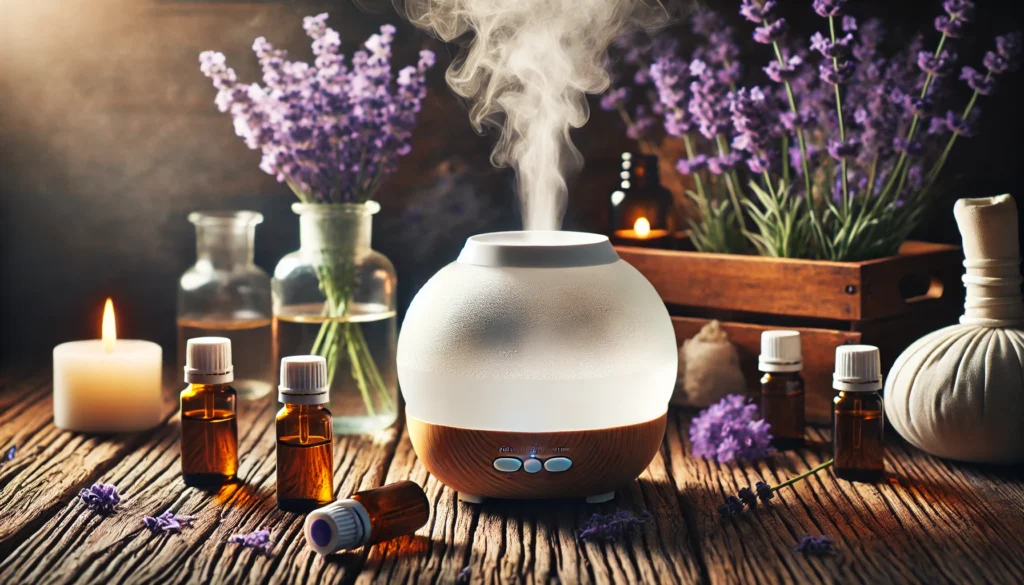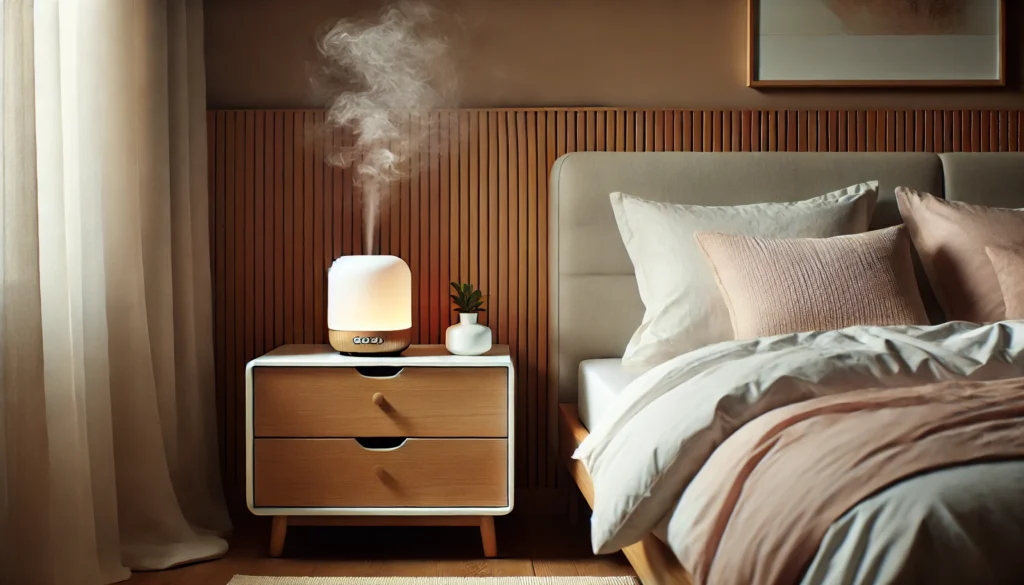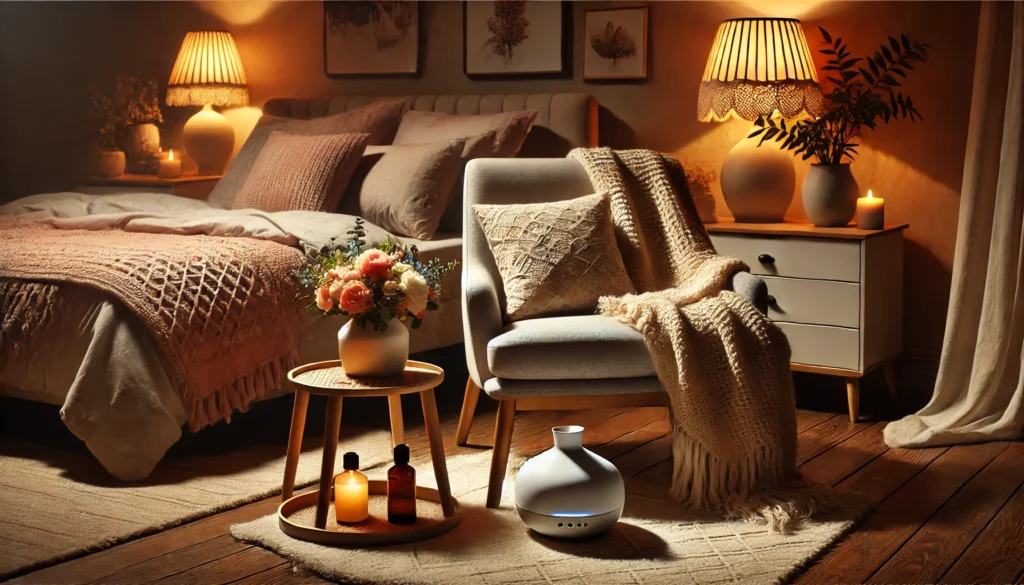In today’s fast-paced world, achieving a restful night’s sleep can sometimes feel like an elusive goal. The pressures of daily life, coupled with the increasing use of technology, often lead to disrupted sleep patterns and a lack of quality rest. In response, many individuals are turning to natural remedies, such as essential oils, to help promote relaxation and improve sleep quality. In this comprehensive guide, we will explore the benefits of essential oils as natural sleep remedies, delve into the science behind their efficacy, and provide practical advice on how to incorporate them into your nightly routine.
You May Also Like: Essential Vitamins for Better Sleep Quality
The Science Behind Essential Oils
Understanding how essential oils work requires exploring the intricate connection between scents and the brain. These concentrated plant extracts are revered not only for their fragrances but also for their potential therapeutic effects.
Aromatherapy and the Limbic System
Essential oils are concentrated plant extracts that capture the natural fragrance and beneficial properties of their source. These aromatic compounds have been used for centuries in various cultures for their therapeutic effects. The science of aromatherapy, which is the use of essential oils for therapeutic purposes, is grounded in the idea that certain scents can influence the body’s limbic system—a part of the brain that controls emotions and memory. The limbic system is directly linked to areas of the brain that manage heart rate, blood pressure, stress, and hormone balance, making it a powerful medium for influencing emotions and physiological responses.
Scientific Studies on Essential Oils
Research has shown that certain essential oils can have a calming effect on the mind and body, which can be beneficial for improving sleep quality. For example, a study published in the journal Evidence-Based Complementary and Alternative Medicine found that lavender essential oil was effective in improving sleep quality and reducing anxiety in patients with insomnia. Another study highlighted the impact of bergamot oil on reducing stress-related symptoms, which often contribute to sleep disturbances. These studies provide empirical support for the use of essential oils in enhancing sleep quality.
Chemical Components and Their Effects
The efficacy of essential oils is not only tied to their scent but also to their chemical composition. Compounds such as linalool, limonene, and beta-caryophyllene play pivotal roles in their therapeutic properties. Linalool, for instance, is prevalent in lavender and has been studied for its sedative effects, while limonene, found in citrus oils, is known for its mood-enhancing properties. Understanding these components can help in selecting the right oils for specific needs.

Essential Oils for Sleep: A Historical Perspective
The use of essential oils as sleep aids is not a new phenomenon. Cultures across the globe have long embraced the power of plant extracts for enhancing rest and relaxation.
Ancient Egyptian Practices
In ancient Egypt, essential oils were used in religious rituals and for medicinal purposes. The Egyptians were pioneers in the art of using plant oils, employing them for everything from embalming to personal care. Their use of oils like frankincense and myrrh in spiritual ceremonies highlighted their belief in the calming and purifying effects of these fragrances.
Greek and Roman Utilization
The Greeks and Romans also utilized aromatic plants and oils to promote relaxation and enhance sleep. Greek physicians like Hippocrates advocated for the use of aromatic baths and massages, recognizing the soothing properties of various oils. Roman baths often incorporated essential oils to enhance the bathing experience, promoting relaxation and social well-being.
Traditional Chinese Medicine
In traditional Chinese medicine, essential oils have been used for thousands of years to balance the body’s energy and improve overall well-being. Oils like sandalwood and jasmine were used in acupressure and massage to harmonize the body’s Qi (energy), demonstrating their integral role in ancient healing practices. Today, the use of essential oils as natural sleep remedies continues to be popular, with many individuals seeking holistic alternatives to pharmaceutical sleep aids.
Essential Oils to Mix for Sleep
When it comes to creating an essential oil recipe for sleep, certain oils are known for their calming and sedative properties. These oils can be mixed to create customized blends that cater to individual preferences and needs.
Lavender
Lavender is perhaps the most well-known essential oil for promoting relaxation and improving sleep quality. Its soothing scent has been shown to reduce anxiety and promote a sense of calm, making it an ideal choice for winding down before bedtime. Lavender’s versatility extends beyond its aroma; it can be used in diffusers, baths, and even in pillow sprays to create a relaxing environment.
Chamomile
Chamomile is another popular essential oil for sleep. Its gentle, floral aroma is known for its calming effects and ability to reduce stress and tension. Chamomile is often used in combination with lavender to create a powerful sleep-inducing blend. The oil can be integrated into nighttime rituals, such as adding a few drops to a warm bath or blending it with a carrier oil for a soothing massage.
Cedarwood
Cedarwood essential oil has a warm, woody scent that is grounding and calming. It is believed to stimulate the release of serotonin, which the brain converts into melatonin—an essential hormone for regulating sleep cycles. This makes cedarwood a staple in sleep-enhancing blends. It can be diffused during the evening or applied to pulse points to help ease the transition into sleep.
Ylang Ylang
Ylang ylang essential oil has a sweet, floral scent that is both calming and uplifting. It is known for its ability to reduce stress and anxiety, making it a valuable addition to any sleep-promoting blend. The oil’s mood-enhancing properties make it a popular choice for those who experience emotional unrest that disrupts sleep. It can be combined with other floral oils or citrus notes for a balanced and soothing aroma.
Vetiver
Vetiver essential oil has an earthy, smoky aroma that is deeply calming. It is often used in aromatherapy to promote relaxation and improve sleep quality. This oil is particularly beneficial for those dealing with insomnia due to its deeply grounding effects. Applying vetiver oil to the soles of the feet or diffusing it in the bedroom can help create a peaceful sleep environment.

How to Use Essential Oils for Sleep
There are several ways to incorporate essential oils into your nightly routine to promote better sleep. Selecting the right method depends on personal preference and the desired intensity of the aroma.
Diffusion
One of the most popular methods for using essential oils is through diffusion. A diffuser disperses essential oil molecules into the air, allowing you to breathe in their calming scents. To create a sleep-promoting atmosphere, add a few drops of your chosen essential oils to a diffuser and place it in your bedroom. Diffusers vary in size and function, from ultrasonic to nebulizing types, each offering a unique way to experience the oils.
Topical Application
Essential oils can also be applied topically to the skin. When using essential oils in this manner, it is important to dilute them with a carrier oil, such as coconut or jojoba oil, to prevent skin irritation. Apply the diluted oil to pulse points, such as the wrists, temples, and neck, to experience their relaxing effects. Creating a bedtime ritual with topical application can enhance the calming experience, signaling to your body that it’s time to wind down.
Bath
Adding essential oils to a warm bath is another effective way to unwind and prepare for sleep. Add a few drops of your chosen oils to the bathwater, and soak for at least 15 minutes to allow the oils to penetrate the skin and soothe the mind. Combining essential oils with Epsom salts can further enhance relaxation, as the magnesium in the salts helps relax muscles and reduce stress.
Pillow Sprays and Linen Mists
Pillow sprays and linen mists are convenient ways to incorporate essential oils into your sleep routine. By lightly spraying your pillow or sheets with a blend of sleep-promoting oils, you can enjoy their calming aromas throughout the night. This method is particularly effective for those who prefer a subtle scent that lingers as they drift off to sleep.
Inhalation
Direct inhalation of essential oils can provide immediate relaxation benefits. This can be done by placing a few drops on a tissue or inhaling directly from the bottle. This method is ideal for quick stress relief or when you need a fast-acting solution to help you relax before bed.
Future Implications and Trends in Aromatherapy
As interest in natural and holistic health continues to grow, the use of essential oils as sleep remedies is expected to become even more prevalent. The evolving landscape of aromatherapy is characterized by emerging trends and technological advancements.
Advances in Research
Advances in research are likely to provide further insights into the mechanisms by which essential oils influence sleep and overall well-being. Ongoing studies are exploring the molecular pathways affected by essential oils, which could lead to more targeted applications for sleep and stress-related conditions. This research will continue to validate the efficacy of essential oils, potentially leading to wider acceptance in conventional medicine.
Technological Innovations
As technology evolves, we may see the development of innovative products that enhance the delivery and efficacy of essential oils. For example, smart diffusers that sync with sleep tracking apps could allow for personalized aromatherapy experiences tailored to individual sleep patterns and preferences. These devices could optimize the timing and intensity of essential oil release, providing a seamless integration with modern lifestyles.
Sustainable and Ethical Sourcing
With the growing demand for essential oils, sustainable and ethical sourcing is becoming increasingly important. Consumers are becoming more aware of the environmental impact of essential oil production and are seeking products that prioritize sustainability. This trend is driving companies to adopt ethical practices, ensuring that their products are both high-quality and environmentally responsible.

Practical Tips for Using Essential Oils
When using essential oils, it is important to consider a few practical tips to ensure their safe and effective use. These guidelines can help you maximize the benefits of essential oils while minimizing potential risks.
Quality Matters
Choose high-quality, pure essential oils from reputable sources to ensure you are getting the full benefits of the oils. Look for oils that are labeled as 100% pure, therapeutic grade, and avoid those with synthetic additives. Reputable brands often provide detailed information about the sourcing and testing of their oils.
Start Small
If you are new to using essential oils, start with a small amount to gauge your body’s response before increasing the dosage. Sensitivity to essential oils can vary, so it’s important to monitor how your body reacts. Begin with a patch test to check for any allergic reactions, particularly if you have sensitive skin.
Consult a Professional
If you have any health concerns or are pregnant, consult with a healthcare professional before using essential oils. Certain oils may not be suitable for everyone, and professional guidance can help you choose the right oils for your needs. Aromatherapists and holistic health practitioners can provide personalized recommendations based on your health profile.
Safe Storage
Store essential oils in a cool, dark place to maintain their potency and extend their shelf life. Oils should be kept in tightly sealed bottles, away from direct sunlight and heat sources. Proper storage ensures that your oils remain effective and safe for use over time.
Blend Wisely
When creating blends, consider the complementary properties of different oils to enhance their effects. Experiment with different combinations to find blends that resonate with you personally. Keeping a journal of your experiences can help refine your preferences and improve your aromatherapy practices.
Conclusion
Essential oils offer a natural and effective way to enhance sleep quality and promote relaxation. By understanding the science behind their efficacy and incorporating them into your nightly routine, you can create a restful environment conducive to a good night’s sleep. Whether you are a health and wellness coach, science journalist, or biohacker, exploring the world of essential oils can provide valuable insights into optimizing sleep and overall well-being. Embrace the soothing power of nature and discover how essential oils can transform your sleep experience and contribute to a healthier, more balanced life. As you integrate these natural remedies into your lifestyle, you’ll find that quality sleep is within reach, paving the way for a more rejuvenated and vibrant existence.
Further Reading:
Essential Oils That Can Help You Sleep Better
7 of the best essential oils for sleep
A systematic review of the effect of inhaled essential oils on sleep
Important Note: The information contained in this article is for general informational purposes only, and should not be construed as health or medical advice, nor is it intended to diagnose, prevent, treat, or cure any disease or health condition. Before embarking on any diet, fitness regimen, or program of nutritional supplementation, it is advisable to consult your healthcare professional in order to determine its safety and probable efficacy in terms of your individual state of health.
Regarding Nutritional Supplements Or Other Non-Prescription Health Products: If any nutritional supplements or other non-prescription health products are mentioned in the foregoing article, any claims or statements made about them have not been evaluated by the U.S. Food and Drug Administration, and such nutritional supplements or other health products are not intended to diagnose, treat, cure, or prevent any disease.


